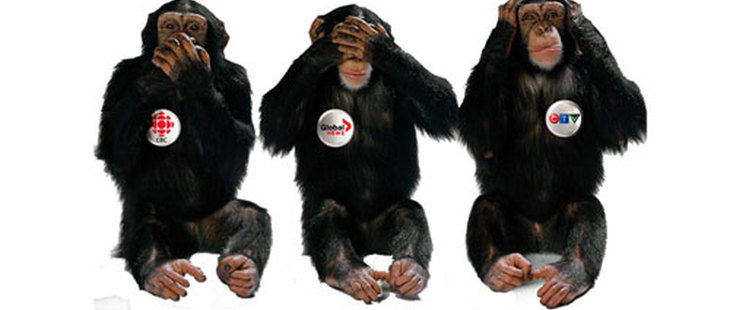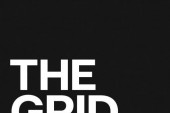

Google “Canadian media critic.” Go ahead. I’ll wait.
Sad, isn’t it? As you’ll have seen, the first two returns are from a blog called Canadian Media Critic by Marc Edge, who makes two mistakes — one grammatical, the other spelling — in the first four words of his latest post, which is four months old.
The next hit is the Canadian Media Research Consortium, which looks promising until you click it and see that nothing’s been posted there since November.
It drops off pretty quickly after that. If you refine your search slightly, by putting “media critic” in quotation marks, one of the top hits is a book, Confessions of a Media Critic, published in Toronto, in 1984.
But over the past week or so, people have finally been giving at least one bit of media the scrutiny it deserves. That blonde lady’s interview with dancer Margie Gillis on SunTV. Not so much an interview, really, as a harangue, a talking at rather than to or with. It wasn’t unfamiliar, this bullying, this asking questions and refusing to hear answers. You see it all the time. Just not on Canadian TV. It’s the sort of non-journalism Jon Stewart rails against in the States.
Now there’s a media critic.
But now that we have our own screaming blonde lady, I was pleased to see Heather Mallick, John Doyle and others not let it slip by, as almost everything in Canadian media does.
True, we don’t usually have this kind of grist. I’m sure you could make the argument that it’s the very reason we don’t do media criticism like they do in the US and the UK. We don’t tend to support extremes in the mold of Fox News or the British tabloids. You could argue, then, that we don’t have the need for our own Jon Stewarts or Ian Hislops to articulate our non-existent outrage.
But though outrage can be fun, there’s more to media criticism than pointing out hypocrisy and calling for resignations.
Just last week, for instance, Toby Young fell on Johann Hari for his questionable practice of dropping in well written, previously published expressions of what his interview subjects said less well in interviews with other people, without giving any indication of what he was doing. It’s not huge — it’s not plagiarism, exactly, and it’s the sort of offence that calls for an apology rather than a firing squad. It’s also the sort of thing that an average reader probably wouldn’t notice, and precisely the sort of thing that undermines media credibility if left alone. And Young’s noticing this comes from a habit, quite general among media types in the UK, of paying attention to what their colleagues are doing and calling them on their shit.
Last year, Roy Greenslades of the Guardian called out another newspaper, the Daily Star, for getting a front page story utterly and provocatively wrong. When’s the last time you can recall the Star taking the Globe to task? Or the Globe even deigning to notice the Post? Or anyone acknowledging the existence of the Sun? (I’m sure there must be some examples, but I can’t remember any — please send in links you’ve got them.)
Even this time, with the blonde screecher, the stories only started appearing in response to a cute note posted on the Canadian Broadcast Standards Council website telling people to stop sending in complaints about the Gillis interview because they couldn’t handle any more. They were, in other words, not being media critics, but covering or commenting on reaction to the media in question. They were following the story rather than driving it.
The exception to this was Doyle, the Globe’s TV columnist, who can probably lay claim to being Canada’s only prominent media critic, even though he probably spends at least as much time writing about soccer and sitcoms. He took the interview apart like he should have, prompting a response from the Sun’s Peter Worthington, about whom I’d have much more to say if he weren’t so very, very close to his merciful, well deserved end. And that’s also as it should be. Someone really tearing into someone else tends to attract more people, both to the fray and the bleachers.
We used to have media critics, in fact, back when our media was, if anything, even less outrageous than it is now, people who figured our papers, magazines and non-fiction TV broadcasts were important enough to warrant keeping an eye on. John Fraser used to be one. I asked him about it at a Massey College event recently, before starting to write this column. He scrunched up his face. Not a good gig, was his message.
Doug Bell still does the job, but he brings such an intensity of both tone and knowledge to the job that his columns can read like screams in a chapel. Without any other voices, or even whispers, it can be more shocking than communicative.
Antonia Zerbisias used to do it, too, in the Star. By her own reckoning, she was the last full-time media critic. Now she writes for the Life section.
It’s disappointing, especially for the nation that gave the world its greatest media theorist, that the only consistent commentary on the media comes from a student publication, the Ryerson Review of Journalism, founded by another ex media critic, Don Obe.
It can be good, and it can be studenty, but what it’s not is part of the mainstream.
We used to have Frank, of course, which could be very good. I recently learned we still sort of do have Frank, but not really. I remember when I started out in this business, people talked about it all the time, worried about being caught up in it, either revealed for your laziness, or getting enmeshed in one of their scams to try to make you look stupid by playing on your ego, or your laziness.
I think that’s probably what it’s about. Laziness. Not the scandals, the nepotism, the conflicts of interest (though that too) but simply not doing our jobs as well as we should, doing things like Johann Hari, an otherwise fascinating and utterly worthwhile journalist, was caught out doing. We need to know people who know our jobs inside out because they do the same thing are watching us, expecting more from us, noticing when we fall down on the job and even simply want to make a name for themselves by taking us down (or taking our jobs).
Maybe that’s what SunTV will be good for, a sort of shot in the arm to the media establishment, injecting us with a virus for the express purpose of building up some critical antibodies.














